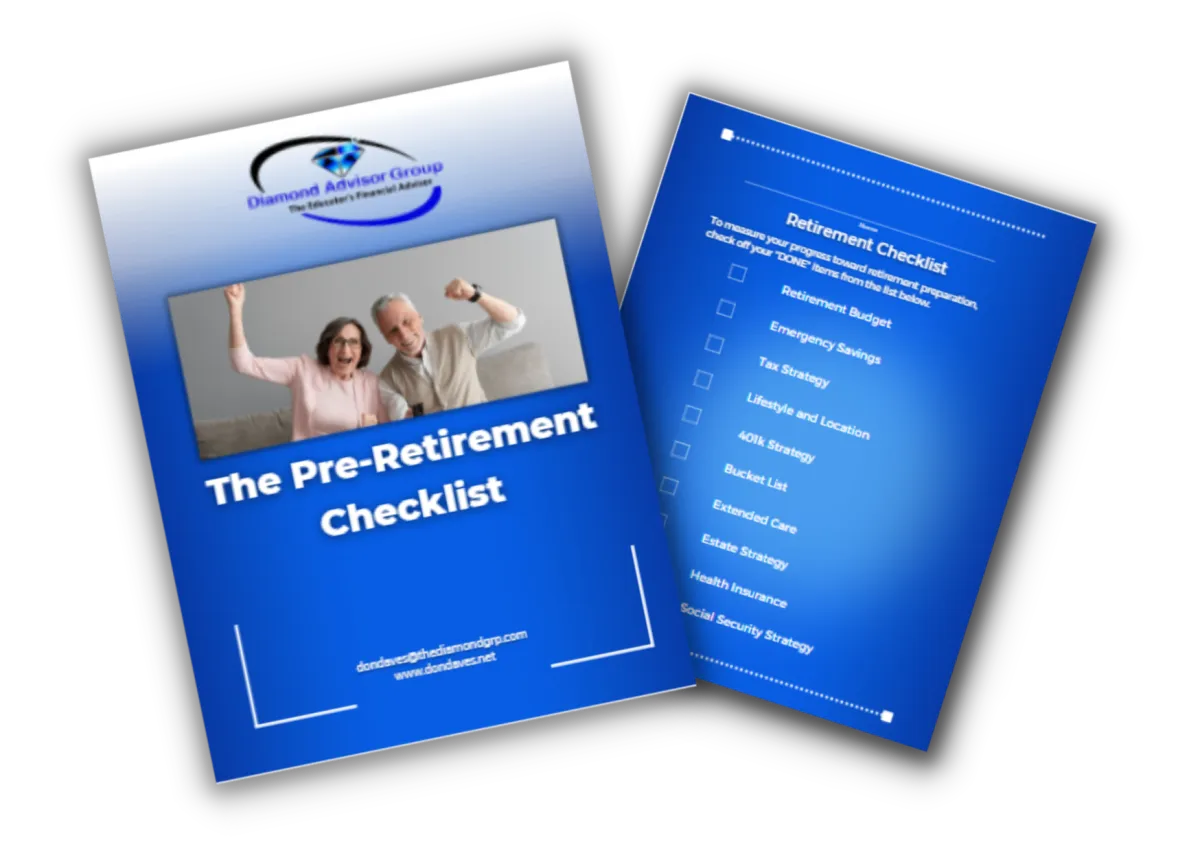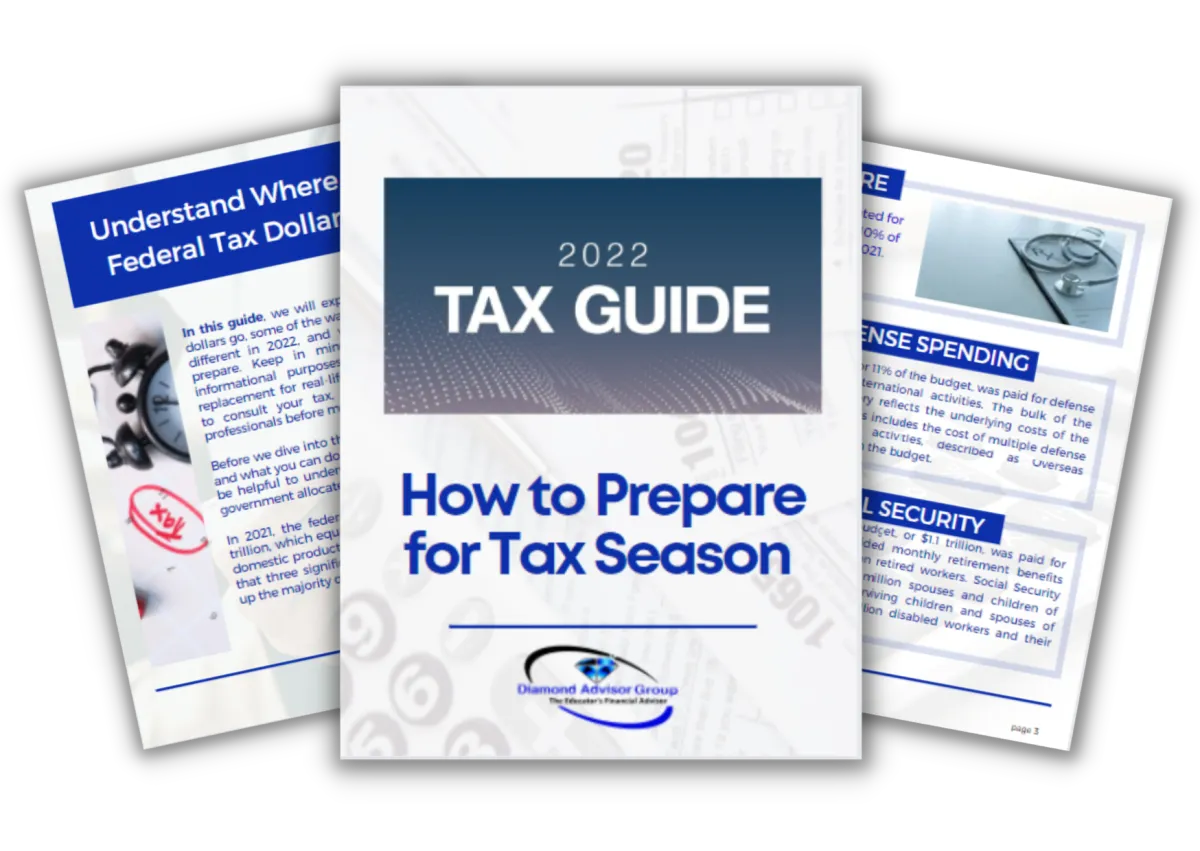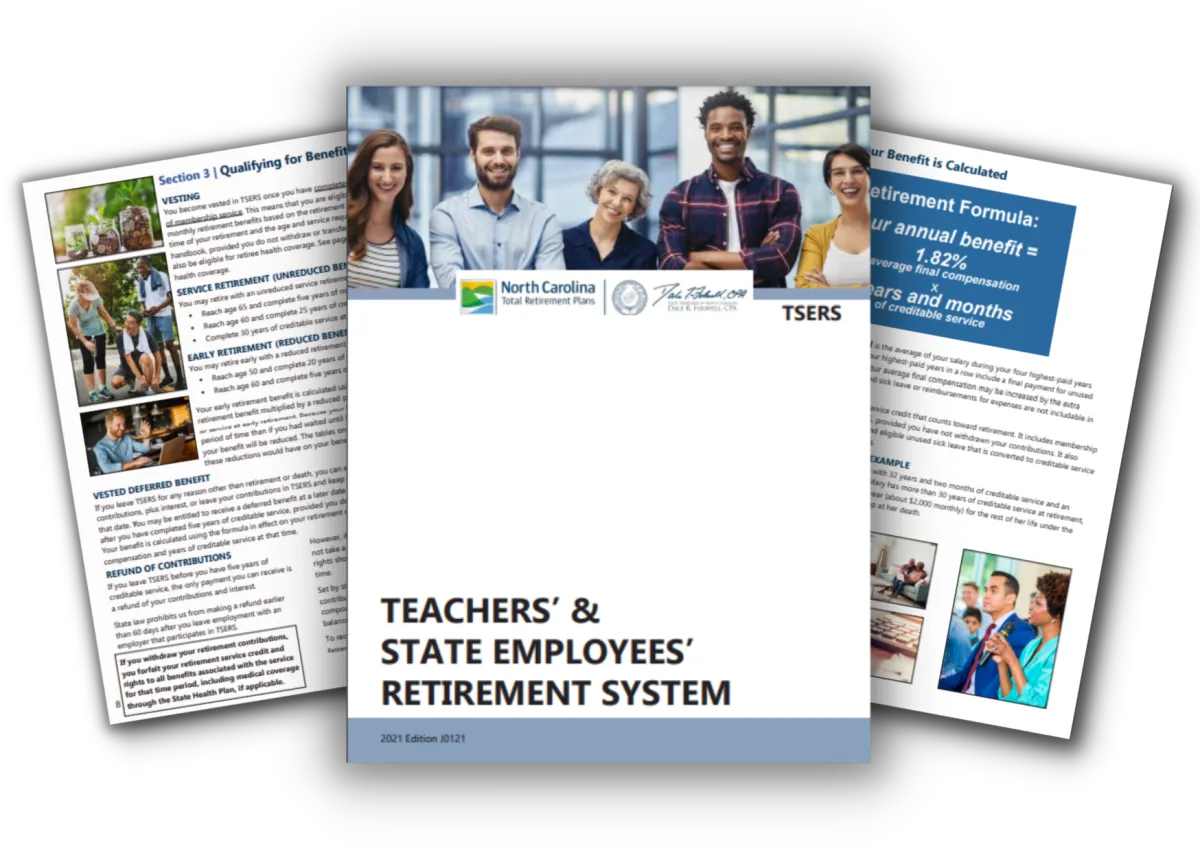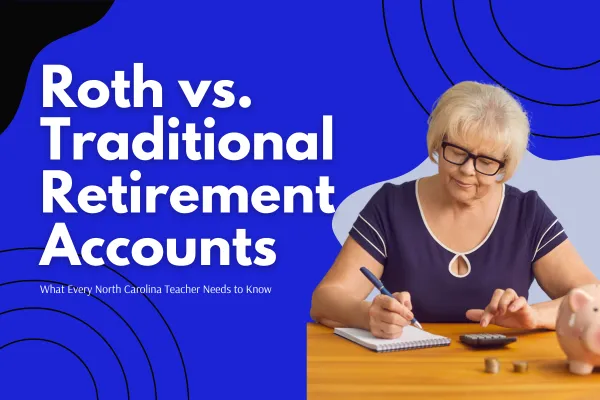

Resources: Blog Articles and Videos
We create free resources about retirement, taxes, estate planning, debt pay-off, budgeting, college planning and
other financial concepts that will help you in planning for your future.
Welcome to our Resource Center
We create free resources about retirement, taxes, estate planning, debt pay-off, budgeting, college planning and
other financial concepts that will help you in planning for your future.
Subscribe To Our Weekly Resource Give Away

7 Essential Steps In
Planning Your Estate
May 18, 2022

9 Facts About
Retirement
May 12, 2022

What You Must Know 5 Years Before Retirement
May 04, 2022

4 Critical Social Security
Facts
April 27, 2022

The Pre-retirement
Checklist
April 20, 2022

Retirement Questions For Educators
April 13, 2022

How Tax Loopholes Will Lessen Your Tax Bills
April 06, 2022

2022 Annual Tax Guide
(How to Prepare for Tax Season)
March 30, 2022

Teachers' & State Employees' Retirement System Handbook
March 23, 2022
Blogs
Navigate the path to financial success with our blog! From savvy investment tips to practical budgeting advice, discover expert insights tailored for you. Secure your financial future with concise, actionable articles designed to empower your journey

Roth vs. Traditional Retirement Accounts: What Every North Carolina Teacher Needs to Know
Roth vs. Traditional Retirement Accounts: What Every North Carolina Teacher Needs to Know
Choosing the right retirement account can feel overwhelming—especially when you’re balancing the unique benefits and salary structures of North Carolina’s public school system. If you’re like nearly 40% of educators, you might be unsure whether a Roth or Traditional retirement account is the best choice for your future. And that uncertainty could cost you thousands of dollars in taxes over your lifetime.
In this post, I’ll break down the key differences between Roth and Traditional accounts, why this decision matters more than you think, and how to avoid leaving money on the table as you plan for retirement.
What’s the Difference Between Roth and Traditional Retirement Accounts?
The main difference lies in when you pay taxes:
Traditional accounts (like 401(k), 403(b), 457(b), or Traditional IRA) let you contribute pre-tax dollars, which lowers your taxable income today. However, when you withdraw the money in retirement, you’ll pay taxes on both contributions and earnings.
Roth accounts (Roth 401(k), Roth 403(b), Roth 457(b), or Roth IRA) require you to contribute after-tax dollars. The big benefit? Withdrawals in retirement are tax-free, including the earnings.
Why Does This Matter for North Carolina Teachers?
Many NC teachers are part of pension systems and may receive Social Security benefits, which can push you into a higher tax bracket during retirement. That’s why choosing a Roth could be a powerful tool: paying taxes now at a potentially lower rate means tax-free withdrawals later when your income is higher.
For example, a Guilford County teacher earning $50,000 per year was originally contributing to a traditional account, thinking it saved her money. But after reviewing her full tax picture—including pension income—she realized she could save over $18,000 in lifetime taxes by switching to a Roth.
How to Decide Which Account is Right for You
To make the best choice, you’ll want to factor in:
Your current tax bracket versus your expected tax bracket in retirement
How your pension and other retirement income affect your taxes
Whether your school district offers both Roth and Traditional options (most do!)
Many plans also allow you to split contributions or switch between account types annually, so you can adjust your strategy as your financial situation changes.
Don’t Just Take My Word for It — Watch the Replay!
If this sounds complicated, you’re not alone. That’s why I hosted a detailed Retirement Ready live session specifically for North Carolina teachers to break down Roth vs. Traditional retirement accounts in plain language.
In this session, you’ll get:
Clear explanations of tax implications
Real-life teacher stories and savings examples
A FREE Roth vs. Traditional comparison chart tailored for NC educators
🎥 Watch the full replay here: https://www.youtube.com/watch?v=IzKUUuzNk6Q&list=PLXzoQDCW-CDhtL4a2XZ-03MoZaWB_kIYX&index=18
Join Us Live Every Wednesday!
Want to dive deeper and get your questions answered live? Our Retirement Ready livestream happens every Wednesday at 7 PM EST—just for North Carolina teachers.
👉 Register here to attend live: https://learn.dondaves.net/retirement-ready-lead-capture-page
Final Thoughts
Choosing between Roth and Traditional retirement accounts is one of the most important decisions you can make for your financial future as a teacher. Don’t leave your retirement to guesswork or generic advice—get the clarity and tailored insights you deserve.
Feel free to drop your questions in the comments or reach out for a free 15-minute consultation to review your specific situation.
Here’s to a smarter, more empowered retirement journey!
Subscribe To Our Weekly Resource Give Away

7 Essential Steps In
Planning Your Estate
May 18, 2022

9 Facts About
Retirement
May 12, 2022

What You Must Know 5 Years Before Retirement
May 04, 2022

4 Critical Social Security
Facts
April 27, 2022

The Pre-retirement
Checklist
April 20, 2022

Retirement Questions For Educators
April 13, 2022

How Tax Loopholes Will Lessen Your Tax Bills
April 06, 2022

2022 Annual Tax Guide
(How to Prepare for Tax Season)
March 30, 2022

Teachers' & State Employees' Retirement System Handbook
March 23, 2022
Blogs
Navigate the path to financial success with our blog! From savvy investment tips to practical budgeting advice, discover expert insights tailored for you. Secure your financial future with concise, actionable articles designed to empower your journey

Roth vs. Traditional Retirement Accounts: What Every North Carolina Teacher Needs to Know
Roth vs. Traditional Retirement Accounts: What Every North Carolina Teacher Needs to Know
Choosing the right retirement account can feel overwhelming—especially when you’re balancing the unique benefits and salary structures of North Carolina’s public school system. If you’re like nearly 40% of educators, you might be unsure whether a Roth or Traditional retirement account is the best choice for your future. And that uncertainty could cost you thousands of dollars in taxes over your lifetime.
In this post, I’ll break down the key differences between Roth and Traditional accounts, why this decision matters more than you think, and how to avoid leaving money on the table as you plan for retirement.
What’s the Difference Between Roth and Traditional Retirement Accounts?
The main difference lies in when you pay taxes:
Traditional accounts (like 401(k), 403(b), 457(b), or Traditional IRA) let you contribute pre-tax dollars, which lowers your taxable income today. However, when you withdraw the money in retirement, you’ll pay taxes on both contributions and earnings.
Roth accounts (Roth 401(k), Roth 403(b), Roth 457(b), or Roth IRA) require you to contribute after-tax dollars. The big benefit? Withdrawals in retirement are tax-free, including the earnings.
Why Does This Matter for North Carolina Teachers?
Many NC teachers are part of pension systems and may receive Social Security benefits, which can push you into a higher tax bracket during retirement. That’s why choosing a Roth could be a powerful tool: paying taxes now at a potentially lower rate means tax-free withdrawals later when your income is higher.
For example, a Guilford County teacher earning $50,000 per year was originally contributing to a traditional account, thinking it saved her money. But after reviewing her full tax picture—including pension income—she realized she could save over $18,000 in lifetime taxes by switching to a Roth.
How to Decide Which Account is Right for You
To make the best choice, you’ll want to factor in:
Your current tax bracket versus your expected tax bracket in retirement
How your pension and other retirement income affect your taxes
Whether your school district offers both Roth and Traditional options (most do!)
Many plans also allow you to split contributions or switch between account types annually, so you can adjust your strategy as your financial situation changes.
Don’t Just Take My Word for It — Watch the Replay!
If this sounds complicated, you’re not alone. That’s why I hosted a detailed Retirement Ready live session specifically for North Carolina teachers to break down Roth vs. Traditional retirement accounts in plain language.
In this session, you’ll get:
Clear explanations of tax implications
Real-life teacher stories and savings examples
A FREE Roth vs. Traditional comparison chart tailored for NC educators
🎥 Watch the full replay here: https://www.youtube.com/watch?v=IzKUUuzNk6Q&list=PLXzoQDCW-CDhtL4a2XZ-03MoZaWB_kIYX&index=18
Join Us Live Every Wednesday!
Want to dive deeper and get your questions answered live? Our Retirement Ready livestream happens every Wednesday at 7 PM EST—just for North Carolina teachers.
👉 Register here to attend live: https://learn.dondaves.net/retirement-ready-lead-capture-page
Final Thoughts
Choosing between Roth and Traditional retirement accounts is one of the most important decisions you can make for your financial future as a teacher. Don’t leave your retirement to guesswork or generic advice—get the clarity and tailored insights you deserve.
Feel free to drop your questions in the comments or reach out for a free 15-minute consultation to review your specific situation.
Here’s to a smarter, more empowered retirement journey!
Other Resources









Subscribe to our weekly resource give away. We create free resources about retirement, taxes, estate planning, debt pay-off, budgeting, college planning and other financial concepts that will help you in planning for your future.
Other Resources









Subscribe to our weekly resource give away. We create free resources about retirement, taxes, estate planning, debt pay-off, budgeting, college planning and other financial concepts that will help you in planning for your future.
Hear From Our Clients
Lorem ipsum dolor sit amet, consectetur adipiscing elit. Nunc elementum scelerisque felis vitae sagittis. Praesent vitae tincidunt sem. Vestibulum nunc risus, placerat non turpis eget, tincidunt tristique magna. Nunc id auctor nisi. Donec iaculis urna faucibus elit rhoncus interdum vel sed elit. Ut bibendum vestibulum sagittis.

David Doe
Simple Company
Lorem ipsum dolor sit amet, consectetur adipiscing elit. Nunc elementum scelerisque felis vitae sagittis. Praesent vitae tincidunt sem. Vestibulum nunc risus, placerat non turpis eget, tincidunt tristique magna. Nunc id auctor nisi. Donec iaculis urna faucibus elit rhoncus interdum vel sed elit. Ut bibendum vestibulum sagittis.

David Doe
Simple Company
Lorem ipsum dolor sit amet, consectetur adipiscing elit. Nunc elementum scelerisque felis vitae sagittis. Praesent vitae tincidunt sem. Vestibulum nunc risus, placerat non turpis eget, tincidunt tristique magna. Nunc id auctor nisi. Donec iaculis urna faucibus elit rhoncus interdum vel sed elit. Ut bibendum vestibulum sagittis.

David Doe
Simple Company
Lorem ipsum dolor sit amet, consectetur adipiscing elit. Nunc elementum scelerisque felis vitae sagittis. Praesent vitae tincidunt sem. Vestibulum nunc risus, placerat non turpis eget, tincidunt tristique magna. Nunc id auctor nisi. Donec iaculis urna faucibus elit rhoncus interdum vel sed elit. Ut bibendum vestibulum sagittis.

David Doe
Simple Company
Lorem ipsum dolor sit amet, consectetur adipiscing elit. Nunc elementum scelerisque felis vitae sagittis. Praesent vitae tincidunt sem. Vestibulum nunc

David Doe
Simple Company
Lorem ipsum dolor sit amet, consectetur adipiscing elit. Nunc elementum scelerisque felis vitae sagittis. Praesent vitae tincidunt sem. Vestibulum nunc

David Doe
Simple Company
Lorem ipsum dolor sit amet, consectetur adipiscing elit. Nunc elementum scelerisque felis vitae sagittis. Praesent vitae tincidunt sem. Vestibulum nunc

David Doe
Simple Company
Lorem ipsum dolor sit amet, consectetur adipiscing elit. Nunc elementum scelerisque felis vitae sagittis. Praesent vitae tincidunt sem. Vestibulum nunc

David Doe
Simple Company
© 2022 Diamond Advisor Group - All Rights Reserved
Disclaimer


